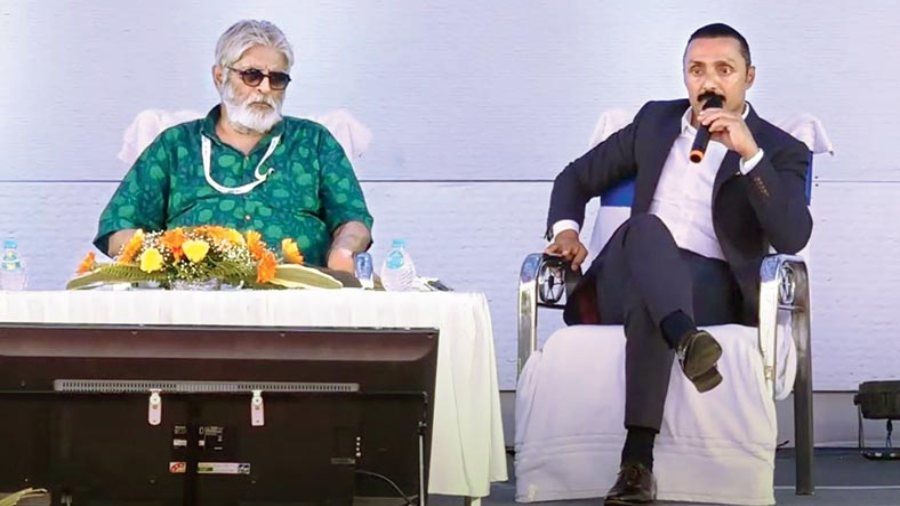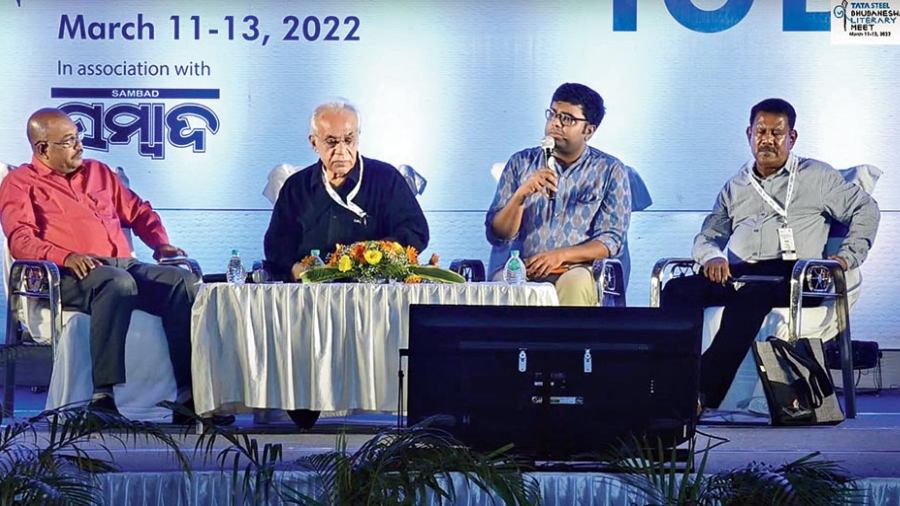Cinema formed a large part of this year’s Tata Steel Bhubaneswar Literary Meet that took place in Bhubaneswar Club on March 11, 12 and 13. With sessions by the likes of Shrayana Bhattacharya, author of Desperately Seeking Shah Rukh Khan; Bikram Grewal who discussed travel in a post-pandemic world and his new book Wildlife in India; Odia author Yashodhara Mishra, the on-ground festival this year came back to patrons in all its flavours. We tuned in to two sessions by Dhritiman Chaterji, Kapilas Bhuyan and Surya Deo on Satyajit Ray’s Centenary and actors Rahul Bose and Jayant Kripalani on film-making and OTT platforms. “It was important to resume the festival after two long years, and the response showed how much the Odia literary world missed us. From Ramakanta Rath’s inauguration onwards it was a triumphant return to live literary events,” said festival director Malavika Banerjee. Here are snippets from the sessions….
SATYAJIT RAY CENTENARY
Sujaan Mukherjee moderated this session that had him highlighting Ray’s Bhubaneswar connect through his books Kailash’e Kelenkari and Hatyapuri. The conversation began with those aspects of Ray that haven’t been spoken about, in the many conversations that have taken place around the stalwart. “No one has ever spoken about how practical the man was, making films on a very limited budget on one hand and spearheading a team he considered family and whose day-to-day existence he was responsible for. He had to care about the nitty-gritties of film-making and was very conscious all the time,” said Dhritiman Chaterji, an actor who had the privilege of working intimately with Ray for a long period of time. The senior actor shared an anecdote from the dream sequence shoot on a beach for his film Pratidwandi, when Ray let a scene with a misplaced hairlip pass with an ‘okay’ instead of a reshoot! “It was a very expensive shoot with a very high budget. He asked us to let the scene be, confident that the critics would manage to find an interpretation to the clip as well,” said Chaterji!
Film reviewer Surya Deo who writes extensively on Odia films, spoke about Matira Manisha that eventually went to Mrinal Sen, on Ray’s suggestion. Reading out letters exchanged between Ray with important personalities of Odia literature and cinema world, Deo showed us the book cover that Ray had designed for author J.P. Das. On the topic of literature, Chaterji spoke of a ‘what if’ world –– what if Ray hadn’t made films? What if he had become an artist? Or someone who just made music? He was as prolific a writer as he was a musician as he was an artist and also happened to make films as well as he wrote them. “He wasn’t a film-maker who wrote occasionally. He was a passionate writer who wrote every day and one of the reasons why he wrote children’s literature was to revive his grandfather’s Sandesh magazine,” Chaterji said. On the other hand, his cinema was derived deeply from literature. So his relationship with literature was as dynamic as he was as a person. “He was very sensitive to the literature of the time and firmly believed that his cinema could derive from literature,” said Chaterji. The senior actor spoke of his hypothesis that Ray’s keen interest in literature came from his intensely socially conscious cinema.
An engrossing debate amongst the panellists on the influence and use of literature in Ray’s films ended the session, a video of which can now be found on Bhubaneswar Literary Meet’s social media channels. Watch it to get a very different perspective on Ray’s works and ideas.

Jayant Kripalani (left) and Rahul BoseJayant Kripalani (left) and Rahul Bose
OTT VS. FILMS IN THE THEATRE
‘Will OTT kill or revive feature film?’ –– this was the question being answered at a session at the lit meet by actors Jayant Kripalani and Rahul Bose. The session began with the actors completely disagreeing with the idea of any art form ‘killing off’ another. The reason was two-pronged –– firstly, an art form can never ‘kill another’ and can only inspire it, believed Kripalani and secondly, since OTT also has feature films, the question should ideally be whether OTT platforms can kill the business of films in theatres, said Bose. He firmly believed that movies that were not considered ‘mainstream’ would now have a welcome migration to the OTT platforms, having himself been a part of two OTT ventures –– Bombay Begum and Bulbul.
Bose, whose films have seen box-office success, was all praises for OTT platforms for the democratisation it has brought forth. “The only reason a producer would think of not migrating to an OTT channel is if he was looking for larger profits. An international license would earn a film more than what OTT has to offer. The only other reason would be if the stars in his film had different opinions about an OTT release,” Bose said. However, he was quick to point out that the star’s decision had less to do with ego and more to do with artistic consideration, knowing that the film would only be done justice to if it released ‘bade parde pe’ (on the big screen).
Speaking at length about the cinema-going experience, the consensus was unanimous –– the theatre is not dying. There will always be the need for a collective experience of cinema-viewing that theatres can offer and there are always going to be movies that cannot be watched on a mobile screen. “From the collective movie experience to the social television experience with family to the very personal experience of OTT viewing, the journey has been long. Once you understand that, you can ask yourself ‘which of these experiences do I want from this particular film?’ Bose quipped.
Kripalani was quick to point out that, as an artist, he couldn’t care less where his movie released as long as it did its job of entertaining people. However, he was rather happy that the OTT platforms managed to ‘kill the critics by making every viewer an unofficial critic of the films’. “Everybody has an opinion and they have devices to share their thoughts immediately while or after watching a film. So the world of critics is slowly depleting and that’s because of social media and OTT platforms,” he said. Both the actors have immense experience in the big world of Bollywood and it was a fascinating experience listening to them speak about the changing face of the industry they have based their lives on.
